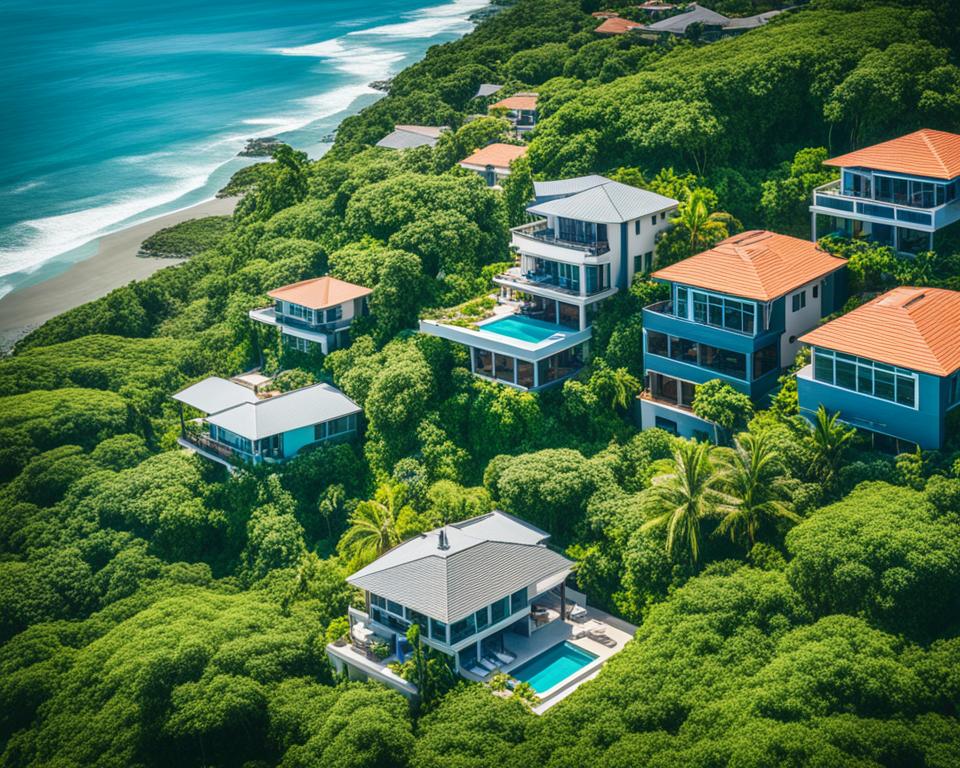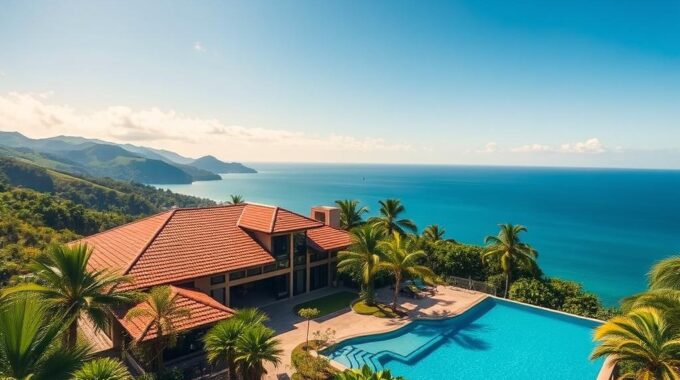In Costa Rica, property owners are increasingly leveraging their assets to secure equity loans, unlocking…

Expats Owning Property in Costa Rica: A Comprehensive Guide
Costa Rica is a land of wonders, from its beautiful beaches to its green rainforests and high mountains. It has drawn in many expats looking for heaven on Earth. The property market in Costa Rica has grown a lot, with many foreigners wanting to buy their own piece of paradise. If you’re thinking about owning property in Costa Rica, this guide will help you understand the important things you need to know.
Key Takeaways
- The Costa Rican property market has seen consistent growth, catering to both local and international buyers.
- Expats enjoy the same property ownership rights as Costa Rican nationals, with the ability to acquire property in their own name or through a legal entity.
- Popular areas for expats to consider when buying property in Costa Rica include the Pacific Coast, Central Valley, and Southern Zone.
- Financing options for expats range from local bank mortgages to specialized international financing services, each with their own advantages and considerations.
- Navigating the legal requirements and tax implications is crucial for a smooth expat property ownership experience in Costa Rica.
Costa Rica’s Alluring Property Market
Costa Rica’s property market has been growing steadily. It’s luring buyers from near and far. Expats love the country’s mix of beautiful beaches, rainforests, and mountains. These features make it a great spot for vacation, retirement, or investment properties.
Trends and Growth
The government in Costa Rica offers tax breaks and an easy way to live there for people buying real estate. Much of the land is protected, which means it’s great for the environment. This makes buying property there a good choice for the planet and for your pocket over time.
Popular Areas for Expats
Expats tend to check out the Pacific Coast, Central Valley, and Southern Zone for property. These places have a lot of options, like bungalows by the sea or villas in the mountains. That means there’s something for everyone’s taste and budget.
Investment Potential and Opportunities
Costa Rica is working hard to improve its roads and phone services. This makes life better for people living there and it helps real estate values go up. Investors can make money by renting out property to tourists or waiting for the value to increase over time.
| Metric | Value |
|---|---|
| Expat real estate investments in Costa Rica offer returns ranging from | 9% to 19% |
| The rentista residency in Costa Rica allows expats to | buy property and start businesses in the country |
| Costa Rica offers private lending opportunities with interest rates between | 12% and 16% annually |
| GAP Investments provides loans ranging from | $50,000 to over $3,000,000 with loan terms between 6 months and 3 years |
| GAP Investments offers a 1-year interest guarantee and charges approximately | 8% of the loan amount as closing costs |
| GAP Investments provides loan-to-value ratios up to | 50% to secure loans with real estate |
| The average interest rate for lenders with GAP Investments ranges from | 12% to 18% per year |
| The minimum loan size offered by GAP Investments is | $50,000 USD |
| Loan closing costs with GAP Investments are approximately | 8% of the loan amount |
| The loan origination process with GAP Investments is | faster than banks and requires less documentation |
| GAP Investments offers an Inner Circle VIP group, giving members exclusive access to | high-yield loan opportunities |
Right now, it’s a good time to look for a vacation home in Costa Rica because buyers have more power to negotiate. Plus, with its welcoming climate and affordable healthcare, many believe it’s a perfect place to retire or live full time.

Legal Requirements for Buying Property in Costa Rica
Looking into Costa Rica’s property market is exciting for expats. It’s key to know the legal stuff about owning land. Good news is, expats can own property like Costa Rican citizens. They can buy in their name or through a legal group.
Property Ownership Rights
In Costa Rica, both locals and foreigners have fair rights to property. Expats can own land fully, just like locals. This equal chance makes buying property easier for expats. They can feel secure investing in homes or rentals here.
Restrictions on Land Ownership
Yet, some areas in Costa Rica have special rules, like the Maritime Zone. This zone is the first 50 meters from the sea. In these places, expats can’t buy land, but can lease it. It’s important for expats to know these details before buying.
Steps for a Smooth Property Purchase
Buying property in Costa Rica follows some important steps. First, you need to check everything about the property. Then, get a survey, confirm the ownership, and set up a legal purchase agreement. Working with a good real estate lawyer is a smart move. They know the laws well and can help avoid problems.

Financing Options for Expat Buyers
Buying a property in Costa Rica offers many financial paths for expats. Knowing these options helps expats living in Costa Rica choose what’s best for their investment needs and budget.
Local Bank Mortgages
Local banks in Costa Rica provide mortgages to expats. The terms can last up to 20 years. Buyers must put down 30% to 50% of the property’s value. Interest rates fall between 8.5% to 10%.
International Financing Services
Expats also have international financing options. These are tailored to their specific needs. The rates may go from 8% to 16% each year.
Comparing Financing Options
Evaluating financing options is crucial. Issues like down payments, loan terms, and interest rates matter. Talking to a finance pro or a real estate agent can guide expats in Costa Rica toward smart choices.
| Financing Option | Down Payment | Loan Term | Interest Rate | Additional Fees |
|---|---|---|---|---|
| Local Bank Mortgage | 30% – 50% | Up to 20 years | 8.5% – 10% | 1.5% administration fee |
| Private Lender | 30% – 50% | Up to 3 years | 12% – 16% | 1.5% administration fee, potential commission |
| Seller Financing | Over 50% | 1 – 3 years | 6% – 9% | N/A |
| Gap Investments | Up to 50% | 6 months – 3 years | 12% – 16% | Approximately 8% of the loan amount |
Knowing all about financing options helps expats living in Costa Rica. They can wisely pick and secure funds for thrilling Costa Rica beachfront properties or other real estate choices.
Expats Owning Property in Costa Rica
Buying property in Costa Rica can pay off for expats. The country’s mix of scenery, strong economy, and welcoming property market attracts many. To own property here, expats need to know and follow the rules. With the right help, the process is clear and easy.
Costa Rica is great for expat investments. It offers excellent property management, real estate choices, and a friendly vibe for foreign buyers. Whether for a vacation, rental, or retirement, its lively towns and natural wonders draw expats in.
| Key Considerations for Expats | Snapshot of Costa Rica’s Property Market |
|---|---|
|
|
Expats can own property just like Costa Rican citizens. They can buy in their name or via a legal entity. This freedom lets you set up your investment in the best way for you.
Although there are some limits on what land you can own, buying here is pretty easy for foreigners. With help from pros in real estate and law, from start to finish, you’ll feel secure.

Whether looking at the Pacific Coast, the Central Valley, or the Southern Zone, Costa Rica has many real estate choices. Knowing the market, laws, and finance options helps you make a smart choice and start your journey as a property owner in this amazing place.
The Property Buying Process for Expats
Buying property in Costa Rica is a rewarding adventure. It can also be complex. Following key steps makes the process smooth. The first step is finding a trusted realtor. They know the local market well and will guide you.
Finding a Trusted Realtor
Choosing an experienced agent is key. They help with Costa Rica’s property laws for expats and offer insight into expat life. Realtors will also help with Costa Rica’s property laws.
Property Viewings and Location Selection
After finding a realtor, check out properties that fit your needs and budget. This lets you see the real estate opportunities firsthand. You also get to pick a location that’s just right for your expat property goals.
Conducting Personal Property Checks
It’s important to inspect the property inside and out. Make sure it meets your standards. Checking the property thoroughly is crucial before buying.
Engaging a Real Estate Attorney
Hiring a real estate attorney is important. They help with the legal side of things. Attorneys ensure property taxes for expats are in order.
Negotiating and Drafting the Offer
Your realtor and attorney help negotiate and make an offer. Think about the current market and the property’s worth. These discussions are important in finalizing the offer.
Due Diligence and Deposit Submission
Before any deposit, do your homework. Do a title search and inspect the property. This checks the property for any issues.
Closing the Sale
Finally, complete the sale. This means registering the purchase and paying all bills. Make sure the property ownership is legally transferred. With your team’s help, this process is easier.
Popular Expat Destinations in Costa Rica
Many expats looking to buy property in Costa Rica are attracted to certain areas. The Pacific Coast, Central Valley, and Southern Zone are special for different reasons. Expats see them as great places to live or invest in.
Pacific Coast
The Pacific Coast, especially Guanacaste and Puntarenas, pulls in expats. It’s loved for beautiful beaches, lively expat communities, and top-notch amenities. This makes it a top pick for vacation homes, retirement spots, or income properties in the Costa Rica real estate market.
Central Valley
The Central Valley, with San Jose at its heart, is perfect for expats seeking city life. It has a modern feel, good infrastructure, and easy access to healthcare and education. This area offers a lot in terms of property management and various housing choices for those wanting an urban lifestyle in Costa Rica.
Southern Zone
The Southern Zone and Caribbean Coast also catch the eye of expats. They offer something special and are strong in terms of potential investment. They attract those who love Costa Rica’s natural beauty, its welcoming real estate scene, and a quieter, calmer living environment.

Costa Rica’s Real Estate Laws for Expats
When you think about buying property in Costa Rica, it’s wise to know the real estate laws. Understanding the difference between titled and concession land is crucial. Titled land, like fee simple, lets expats have full ownership rights. They can own the land without limits. Meanwhile, concession land is rented from the government. It has more rules for non-citizens.
Expat investors in Costa Rica can pick from various property types. These include villas, apartments, even jungle retreats. The financing options for expats also greatly impact their buying plans. Things like needing to be a resident and the laws about ownership influence what’s available.
Property Management Services for Expat Owners
Expat property owners in Costa Rica find costa rica expat property management services very useful. These services help them take care of their investments. They include routine maintenance, repairs, and keeping the property in top shape.
Maintenance and Upkeep
In Costa Rica, property management companies offer full maintenance services. They keep up with cleaning, gardening, and make any needed repairs. This means your property is well-looked after, even if you’re far away.
Rental Property Management
For expats wanting to earn rental income, costa rica expat real estate agents can help. They offer rental management services like finding tenants, managing leases, and collecting rent. This way, owners can enjoy their investments without worrying about the details.

Taxes and Fees for Expat Property Owners
Investing in costa rica property means knowing all about the taxes and fees. There’ll be finances to think about from the start of your purchase. And expenses won’t stop once you start owning the property.
Real Estate Transfer Tax
Buying a property in Costa Rica means paying a transfer tax. It’s usually 0.75% of the property’s price. This tax is due at closing, so make sure to include it in your budget.
Notary and Registration Fees
Don’t forget about notary and registration fees. These costs are part of buying a property and can be high. Planning financially for these fees is a must when buying property in costa rica as an expat.
Property Taxes
Every year, expat property owners in Costa Rica must pay property taxes. The amount depends on the property’s worth and where it is. Normally, it’s 0.25% of your property’s value, which is quite low. Still, keep up to date with any changes in these taxes to avoid any issues.
It’s very important for expats to know about costa rica property taxes and costa rica property management. Also, having a solid understanding of the expatriate guide to owning property in costa rica is key. This knowledge helps in planning the financial side of investing in this amazing country.

Building an Expat Community in Costa Rica
Owning property in Costa Rica goes beyond just making a smart investment. As an expat, it opens doors to new friends who share your journey. By becoming part of the local life, you get to truly enjoy both your investment and the culture of this amazing place.
Expat Networks and Resources
Costa Rica has a lively expat community, full of support from various clubs, organizations, and online groups. They offer help on everything from expat residency requirements to managing your property. They even make it easier to meet other expat property owners. Joining these groups can smooth your path and make you feel right at home.
Integrating into Local Communities
Having a home in Costa Rica also lets you connect with local people. You can learn about their culture and ways by joining in local events or helping out in the neighborhood. These experiences will enhance your life as an expat property owner and give you a deeper connection with the locals.

Getting involved in both the expat and local communities brings richness to your life as an expat property owner in Costa Rica. This network outside your home country can make living here even more rewarding. It’s about finding a place where you truly belong and thrive.
Conclusion
Owning property in Costa Rica as an expat is worth it. It’s about exploring the property market and understanding the legal requirements. Look into financing options and getting involved with other expats. This way, you can buy your piece of paradise in this amazing country. This guide shares vital info for smart choices and a smooth buying process.
The Costa Rican property market is always growing. There are many ways to finance property as an expat too. If you love the Pacific Coast, the lively Central Valley, or the peaceful Southern Zone, you’ll find your place. This country is full of opportunities for expat owners.
Knowing the real estate laws for expats and the taxes is crucial. Plus, there’s property management services that can help. Being part of the expat community and local life makes your place more than just a house. It turns into a key part of a fulfilling and rewarding lifestyle.
FAQ
What are the key trends and growth areas in the Costa Rican property market for expats?
The Costa Rican property market is growing steadily, attracting both local and international buyers. Expats love the diverse landscapes, such as stunning beaches and lush rainforests. They find it a great place for vacation homes, retirement properties, and investments.The Pacific Coast, Central Valley, and Southern Zone are top picks for those looking to buy. These areas offer beautiful locations and amenities for expat living in Costa Rica.
What are the legal requirements for expats to purchase property in Costa Rica?
Expats in Costa Rica have the same buying rights as locals. They can buy property in their name or through a company. Certain areas, like the Maritime Zone, have land ownership restrictions.The buying process includes steps like due diligence and property surveys. Expats should hire a real estate lawyer to help them buy safely.
What financing options are available for expats buying property in Costa Rica?
When buying in Costa Rica, expats can look into mortgages from local banks or international services. Local bank loans offer good rates but may need more paperwork. International options are also available.It’s important to compare different financing options. Talking to a financial expert or real estate agent can help expats choose the best path.
What are the popular destinations for expats to consider when buying property in Costa Rica?
Expats usually look at the Pacific Coast, Central Valley, and Southern Zone for homes. The Pacific Coast, especially Guanacaste and Puntarenas, is loved for its beaches and expat communities.The Central Valley has a modern lifestyle and easy access to services. The Southern Zone and Caribbean Coast offer unique investment chances as well.
What are the legal considerations for expats when buying property in Costa Rica?
Buying property in Costa Rica, expats should understand titled and concession land. Titled land allows full ownership, similar to locals. Concession land is leased from the government.Expats can find different types of properties, from villas to jungle retreats. They should match their choice with their goals and preferences.
What are the taxes and fees associated with owning property in Costa Rica as an expat?
Expats who own property should know about the realestate transfer tax. It’s usually 0.75% of the property’s price. There are fees for notary services and property registration too.Annual property taxes in Costa Rica also apply, based on the property’s value and location. Knowing these costs helps expats budget and plan their investment well.
How can expats build a supportive community when owning property in Costa Rica?
Living in Costa Rica is a chance for expats to connect with the local and expat communities. Social clubs, expat organizations, and online groups offer support and information.Being active in these communities helps expat homeowners enjoy and make the most of their Costa Rican lifestyle.
Source Links
- https://crie.cr/buying-property-in-costa-rica-as-an-expat/
- https://osatropicalproperties.com/blog/tax-implications-for-expats-owning-property-in-costa-rica
- https://flamingobeachrealty.com/is-it-a-good-time-to-buy-real-estate-in-costa-rica/
- https://costaricaproperties.cr/uncategorized/own-your-dream-home-in-costa-rica-easier-than-you-think/
- https://crie.cr/investment-opportunities-for-expats-in-costa-rica/
- https://www.hrgvacations.com/blog/costa-rica-real-estate/guide-buying-property-costa-rica-what-you-need-know
- https://www.remax-oceansurf-cr.com/financing-for-foreigners-in-costa-rica
- https://gapinvestments.com/en/financing-for-foreigners-in-costa-rica/
- https://www.tresamigos-cr.com/buying-property-costa-rica
- https://gapinvestments.com/en/secure-loans-in-costa-rica/
- https://gaprealestate.com/the-best-places-to-live-in-costa-rica/
- https://osatropicalproperties.com/blog/how-do-expats-choose-where-to-live-in-costa-rica
- https://www.gapequityloans.com/en/costa-rica-home-equity-loans-guide/
- https://www.gapequityloans.com/en/loan-application-costa-rica/
- https://quatro.legal/can-non-resident-foreigners-own-property-in-costa-rica/
- https://gap.cr/ownership-and-costa-rica-immigration/
- https://www.gapequityloans.com/en/commercial-loans/
- https://www.gapequityloans.com/en/costa-rica-home-equity-loans/
- https://www.gapequityloans.com/en/construction-loans/
- https://www.gapequityloans.com/en/equity-loans-faq/
- https://brighttax.com/blog/panama-or-costa-rica-expat-buying-guide/
- https://www.greenbacktaxservices.com/country-guide/tax-guide-for-americans-living-in-costa-rica/
- https://www.specialplacesofcostarica.com/property-management/costa-rica-taxes/
- https://crie.cr/estate-planning-for-expats-in-costa-rica/


